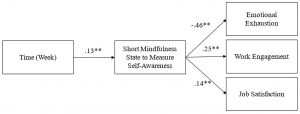Live Mindfulness Training is More Effective than Recorded Training in Reducing Stress.
By John M. de Castro, Ph.D.
“You get to a point in your meditation practice, when guided meditation just isn’t helpful or necessary. But until you reach that point, it can be incredibly useful to have someone giving you instructions as you meditate.” – Hannah Knapp
Mindfulness training has been shown to improve health and well-being in healthy individuals. It has also been found to be effective for a large array of medical and psychiatric conditions, either stand-alone or in combination with more traditional therapies. One of the primary effects of mindfulness that may be responsible for many of its benefits is that it improves the physiological and psychological responses to stress.
The vast majority of the mindfulness training techniques, however, require a trained teacher. The participants must be available to attend multiple sessions at scheduled times that may or may not be compatible with their schedules and at locations that may not be convenient. As an alternative, training over the internet has been developed. This has tremendous advantages in decreasing costs, making training schedules much more flexible, and eliminating the need to go repeatedly to specific locations. But the question arises as to the effectiveness of internet training versus live instruction in reducing stress and improving psychological well-being.
In today’s Research News article “The Relative Contributions of Live and Recorded Online Mindfulness Training Programs to Lower Stress in the Workplace: Longitudinal Observational Study.” (See summary below or view the full text of the study at: https://www.ncbi.nlm.nih.gov/pmc/articles/PMC8817217/ ) Wolever and colleagues examined the perceived stress scores of participants of a 30-day online mindfulness program the contained live instruction and recordings of the live trainings.
They found that the greater the practice over the month the greater the reduction in perceived stress. But this was true for live trainings and not for recorded trainings. Participants who engaged in live trainings had significant reductions in stress while those who viewed recorded teachings did not.
These results suggest that live trainings, even when presented over the internet, have greater impact on stress than the same trainings presented as recordings. It is possible that highly stressed participants don’t have the flexibility in their schedules to attend trainings at scheduled times (live trainings) but can attend trainings at times conducive to their own schedules.
“online mindfulness-based treatment was considered as an innovative and effective approach in terms of the reduction of . . . stress among the general population.” – Yun Zhang
CMCS – Center for Mindfulness and Contemplative Studies
This and other Contemplative Studies posts are also available on Twitter @MindfulResearch
Study Summary
Wolever, R. Q., Finn, M., & Shields, D. (2022). The Relative Contributions of Live and Recorded Online Mindfulness Training Programs to Lower Stress in the Workplace: Longitudinal Observational Study. Journal of medical Internet research, 24(1), e31935. https://doi.org/10.2196/31935
Abstract
Background
Despite numerous gaps in the literature, mindfulness training in the workplace is rapidly proliferating. Many “online” or “digital mindfulness” programs do not distinguish between live teaching and recorded or asynchronous sessions, yet differences in delivery mode (eg, face-to-face, online live, online self-guided, other) may explain outcomes.
Objective
The aim of this study was to use existing data from an online mindfulness solutions company to assess the relative contribution of live and recorded mindfulness training to lower perceived stress in employees.
Methods
Perceived stress and the amount of live and recorded online mindfulness training accessed by employees were assessed during eMindful’s One-Percent Challenge (OPC). The OPC is a 30-day program wherein participants are encouraged to spend 1% of their day (14 minutes) practicing mindfulness meditation on the platform. We used linear mixed-effects models to assess the relationship between stress reduction and usage of components of the eMindful platform (live teaching and recorded options) while controlling for potential reporting bias (completion) and sampling bias.
Results
A total of 8341 participants from 44 companies registered for the OPC, with 7757 (93.00%) completing stress assessments prior to the OPC and 2360 (28.29%) completing the postassessment. Approximately one-quarter of the participants (28.86%, 2407/8341) completed both assessments. Most of the completers (2161/2407, 89.78%) engaged in the platform at least once. Among all participants (N=8341), 8.78% (n=707) accessed only recorded sessions and 33.78% (n=2818) participated only in the live programs. Most participants engaged in both live and recorded options, with those who used any recordings (2686/8341, 32.20%) tending to use them 3-4 times. Controlling for completer status, any participation with the eMindful OPC reduced stress (B=–0.32, 95% CI –0.35 to –0.30, SE=0.01, t2393.25=–24.99, P<.001, Cohen d=–1.02). Participation in live programs drove the decrease in stress (B=–0.03, SE=0.01, t3258.61=–3.03, P=.002, d=–0.11), whereas participation in recorded classes alone did not. Regular practice across the month led to a greater reduction in stress.
Conclusions
Our findings are in stark contrast to the rapid evolution of online mindfulness training for the workplace. While the market is reproducing apps and recorded teaching at an unprecedented pace, our results demonstrate that live mindfulness programs with recorded or on-demand programs used to supplement live practices confer the strongest likelihood of achieving a significant decrease in stress levels.









